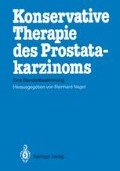Zusammenfassung
In den letzten Jahren sind mit den LHRH-Analoga neue Behandlungsprinzipien des Prostatakarzinoms zur Einführung in die klinische Routine zur Verfügung gekommen. Im Prinzip stehen Agonisten und Antagonisten des Releasing Hormones des Luteinisierenden Hormones (LHRH) zur Verfügung. Die Antagonisten befinden sich noch in der Entwicklungsphase. Die LHRH-Agonisten bieten eine neue Möglichkeit, die Androgenproduktion in den Hoden zu unterdrücken. Derzeit scheint der größte Vorteil dieser Behandlung gegenüber der klassischen Östrogenbehandlung oder der Kastration in der Verminderung körperlicher und psychologischer Nebenwirkungen zu liegen. Diesem klinischen Vorteil stehen hohe Kosten gegenüber, und es erscheint fraglich, ob die LHRH-Agonisten in der Lage sein werden, mit den anderen Behandlungsformen des Prostatakarzinoms, vor allem mit der Kastration, zu konkurrieren.
Preview
Unable to display preview. Download preview PDF.
Literatur
Brisset J-M, Boccon-Gibod L, Botto H, Carney M, Cariou G, Duclos J-M, Duval F, Gonties D, Jorest R, Lamy L, Le Due A, Mouton A, Petit M, Prawerman A, Richard F, Savatosky I, Vallencien G (1987) Anandron (RU 23908) associated to surgical castration in previously untreated stage D prostate cancer: a multicenter comparative study of two doses of the drug and of a placebo. In: Khoury S, Murphy GP (eds) Cancer of the Prostate, Alan R Liss, New York (in press)
Koutsilieris M, Faure N, Tolis G, Laroche B, Robert G, Ackman CFD (1986) Objective response and disease outcome in 59 patients with stage D2 prostatic cancer treated with either Buserelin or orchiectomy. Urology 3: 221–228
The Leuprolide Study Group (1984) Leuprolide versus Diethylstilbestrol for metastatic prostate cancer. N Engl J Med 311: 1281–1286
Navratil H (1987) Double-blind study of anandron versus placebo in stage D2 prostate cancer patients receiving Buserelin. Results on 49 cases from a multicentre study. In: Khoury S, Murphy GP (eds) Cancer of the Prostate, Alan R Liss, New York (in press)
Parmar H, Lightman SL, Allen L, Phillips RH, Edwards L, Schally LV (1985) Randomised controlled study of orchidectomy vs long-acting D-Trp-6-LHRH microcapsules in advanced prostatic carcinoma. Lancet 30: 1201–1205
Roger M, Duchier J, Lahlou N, Nahoul K, Schally AV (1985) Treatment of prostatic carcinoma with D-Trp-6-LHRH: plasma hormone levels after daily subcutaneous injections and periodic administration of delayed-release preparations. Prostate 7: 271–282
Schroeder FH, Lock MTWT, Chadha DR, Debruyne FMJ, Karthaus HFM, De Jong FH, Klijn JGM, Matroos AW, De Voogt HJ (1987) Metastatic cancer of the prostate managed by Buserelin (HOE 766) versus Buserelin plus cyproterone acetate (CPA). J Urol, in press-
Editor information
Editors and Affiliations
Rights and permissions
Copyright information
© 1987 Springer-Verlag Berlin Heidelberg
About this paper
Cite this paper
Schröder, F.H. (1987). LHRH-Analoga bei der Behandlung des metastasierten Prostatakarzinoms. In: Nagel, R. (eds) Konservative Therapie des Prostatakarzinoms. Springer, Berlin, Heidelberg. https://doi.org/10.1007/978-3-642-72613-2_10
Download citation
DOI: https://doi.org/10.1007/978-3-642-72613-2_10
Publisher Name: Springer, Berlin, Heidelberg
Print ISBN: 978-3-540-17724-1
Online ISBN: 978-3-642-72613-2
eBook Packages: Springer Book Archive

